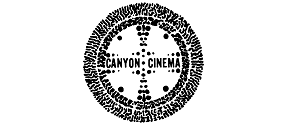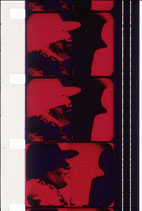Charlemagne 2: Piltzer
- Pip Chodorov |
- 2002 |
- 22 minutes |
- COLOR |
- SOUND
Rental Format(s): 16mm film
On December 9, 1998, Charlemagne asked me to bring friends to his piano concert at an opening at the Gérard Piltzer gallery in Paris, and to bring a movie camera. I shot two rolls of super-8 tri-x at 9 frames per second and recorded the sound on mini-disc. I forgot about the rolls of film and left them undeveloped for a year and a half. When I found them and processed them as negative, I was surprised with the results and I blew them up onto 16mm positive high-contrast stock. I then contact printed the positive 16mm to negative 16mm and optically printed frame by frame through these positive and negative master rolls onto color negative stock through colored filters, following a precise notation of the concert music. I chose the following principles:
* The 6945 notes played in the concert correspond to 6923 frames of super-8 film that were shot. No frames are left out or printed twice.
* Speed of playing controls speed of frame succession.
* Discordant diminished fifths are translated into the following methods of visual discordance for the seven parts of the concert in an attempt to replicate in the visual cortex the harmonic overtones that arise in the temporal lobe when listening:
Flicker between negative and positive,
between opposites on color wheel (blue/yellow),
between opposites in retinal cone sensitivities (red/green),
between different flicker frequencies (frequencies beating in discordance);
clusters of b/w negative and monochrome frames to create overtonal retinal afterimages,
left/right screen masking and mirror image printing,
crossfading between negative and positive images.
* When more than two notes are played, the additional colors correspond to the complexity of sound frequencies.
The final result is at once a diary film, a document of the concert, a structural flicker film, a hand-processed film, a graphic representation of music, and an attempt to apply cognitive principles in sensation and perception to film art.


